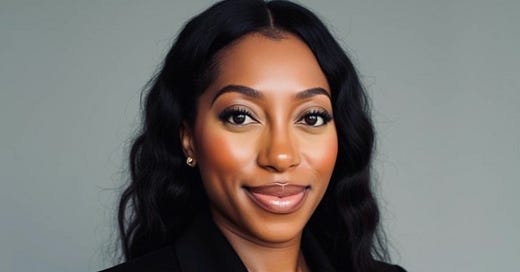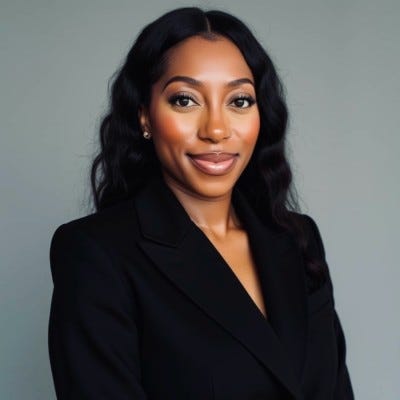From the Home Office to Head of Prosecutions: Stephanie Ezechukwu’s Path to Impact
Yours Truly, TheLawyerFiles
Welcome to the ninth blog post for TheLawyerFiles!
First, thank you for subscribing. Please stay tuned for insightful interviews, expert advice, and real-life experiences from legal professionals to help you navigate your journey to becoming a solicitor.
In this edition, we feature Stephanie Ezechukwu, Head of Prosecutions at the DVSA and a seasoned Civil Servant whose legal journey exemplifies resilience, representation, and purposeful leadership. From shaping high-stakes policy at the Home Office to contributing to landmark legislation like the Domestic Abuse Act 2021, Stephanie’s career reflects a deep commitment to justice that goes beyond theory—grounded in lived experience and public impact. Her dedication to mentoring, advocacy for underrepresented voices, and tireless pursuit of growth—even while navigating motherhood and SQE studies—demonstrates how legal excellence and personal authenticity can go hand in hand. Stephanie’s story is a powerful reminder that leadership in law is about courage, compassion, and being “in the room” where change happens.
Let’s dive in! 🚀

From the Home Office to your current role as Head of Prosecutions at the DVSA, your career has spanned powerful public-facing roles. What has working in government taught you about the intersection of law, policy, and real-life impact?
One of the main things I’ve learned is this: being in the room matters. We need people who look like me and you represented across all areas of government in order to create policies, strategies and legislation that reflect the real needs of diverse communities.
At the Home Office, I worked in two high-profile, often contentious areas. The first was Asylum and Immigration, where we covered deportations, appeals, entry clearance, human rights, Article 8 cases, and retained rights. The second was Public Protection, where we covered counter-extremism, community cohesion, hate crimes, Domestic Abuse (DA), Violence Against Women and Girls (VAWG), and more.
These weren’t abstract policy areas at all. They affected real people and had real-life consequences and that experience taught me the importance of representation and diversity in every space where decisions are made.

You’ve shared your story of resilience — particularly sitting and passing an exam after a major personal challenge. What advice do you have for aspiring lawyers dealing with setbacks while juggling life’s unpredictability?
Hmm. I think simply, be kind to yourself. It’s OK to say you’re struggling. It’s OK to ask for help. It’s OK to pause (or stop) when you need to. We put way too much pressure on ourselves to push through everything, even when we’re unwell or facing serious challenges. But you need to be honest with yourself about what you can bear. I know I took on far more than I could handle at different points in my life, and that always made things harder for me.
So my advice is simply to be kind to yourself. Try not to do it alone. Get help, seek support, lean on others. I encourage people to have at least three people in your life you can be completely honest with, about your fears, your struggles, your dreams. It doesn’t have to be everyone you let in, but it must be someone.

You’ve spoken and mentored across topics like domestic abuse, human rights, and hate crime. What drives your passion for these areas of law, and which moment in your work has left a lasting impact?
Like many in the Law space, I have a personal connection to the areas I’ve worked in. There’s a lived experience, and a desire to pay it forward for me.
I’ve faced personal struggles across some of these areas (or someone close to me has) but that hasn’t stopped me from thriving. In fact, it’s pushed me to make that difference, and as someone who has come out on the other side, I feel a duty to show others that they can too.
There is also some encouragement there because no one is more special than the next. If I can make it in this topsy turvy legal world you can too and vice versa. We can use each other to inspire our shared future progress and success.
But in terms of one moment I’ll always be proud of, I think it has to be my work on The Domestic Abuse Act 2021. While at the Home Office, I helped write the statutory guidance that accompanied the Act. That work spanned 18 months and remains one of my most cherished accomplishments.
The highlights were that we expanded the statutory definition of domestic abuse to include the various forms of abuse, including tech abuse, spiritual abuse, emotional abuse and economic abuse.
I can’t really begin to describe how proud I am of myself and of my team for working on that. It’s probably the most rewarding thing I’ve ever done professionally as its contributed to a significant shift in how the UK views and responds to domestic abuse and I’m so proud to have been a part of that and to have worked with such phenomenal individuals, charities and stakeholders across the DA and VAWG sector to make it happen.

For younger legal professionals who look up to you, what’s one piece of advice you wish someone had given you early on in your career?
One of the best pieces of advice I’ve ever received is also really simple: the worst they can say is no.
Rejection doesn’t mean you’re not good enough. It doesn’t mean you won’t make it. It just means not this time, not here or not yet.
I wish I had known that earlier. A “no” isn’t personal and it doesn’t define your value, your potential or your purpose.
After 11 years in the legal space within the Civil Service, I can say with certainty that the “no’s” made me tougher. They made me more confident and they made me more intentional. They also forced me to reflect and ask: What can I improve? Where do I need to invest more in myself?
Which brings me to a second bit of advice for young law professional - you need to invest in yourself first. We often look for ways to prove our worth within this space but real growth actually starts with personal investment and that can include asking a friend to help with your CV, finding a mentor, hiring a coach and consuming really good content such as books, videos, newsletters, articles etc.
Let’s be real, most of what you need to grow is already accessible. Go find it. Go read it. Go research it and be intentional. Investing in yourself actually means spending money. Sometimes it doesn’t but most times it does. That could mean buying a book, paying for a course or event or hiring someone to teach you what you need to know. Things can’t always be free. I tell my Mentees that you have to be ready to invest in yourself first. Depending on what you need, be prepared to pay the price be that in time, money or just prioritising what matters.

With your recent move into SQE studies while already holding a senior position, what has that balancing act looked like for you? Any time management techniques that have helped?
Oh this is such a timely question! For context for those who don’t know, I’m a Grade 7 Civil Servant, which is a senior leadership role with my leading teams of people as the “Head of” a departmental business area. I’m also an SQE Apprenticeship student. That means I do my day job Monday to Friday and I also study part-time via an SQE prep course alongside my role.
What’s helped me?
Delegation: Wherever possible, at work or at home. I don’t try to do everything myself.
Asking for help: There’s no shame in it. It’s necessary and I do it often.
Synchronising calendars: I merged my work and study diaries early on. It helps me plan exams, deadlines, and key assignments effectively.
Tech tools: I use Notion to organise notes, prep for exams and stay on track. Tools like ChatGPT help me to summarise my revision notes so I can distill what I need to know down to very small cards.
Scheduled rest: I’m a Christian so I don’t play with my seventh day! I take a weekly Sabbath. It’s a day where I don’t study. I rest, reset, and recharge mentally, physically and spiritually. Even if you’re not a Christian, I think that’s really important.
A few honourable mentions too, because it’s not just about efficiency of the mind, it’s also about the body, so I try to sleep well (where possible - I recently became a mum for the first time!), stay hydrated with loads of water, eat nourishing and nutritious food and move my body.
It’s still a work in progress, especially with a newborn in the mix but we’re doing our best and that’s enough for me for now.
—
Stephanie Ezechukwu - https://www.linkedin.com/in/stephanieezechukwu/
Head of Prosecutions | SQE Student | Mentor
Thank you for reading the ninth edition of TheLawyerFiles!
I hope Stephanie’s journey has offered you insight and encouragement—especially if you’re navigating the legal field while juggling personal challenges, career progression, or the pursuit of qualification. Her story is a powerful reminder that resilience, representation, and intentional growth can shape not just a career, but the impact you make through it. Whether in policy rooms, mentoring spaces, or as a leader in government, Stephanie leads with conviction, compassion, and an unwavering commitment to making a difference.
🎧 Stay tuned—our podcast episode with Eve is coming soon, where we’ll explore her experiences in greater depth and uncover more lessons from her time at Freshfields. Make sure to subscribe so you don’t miss it!
Until next time—keep learning, keep growing, and keep moving forward with purpose. 🌍⚖️
—Denice Obeng
—
💬 If You or Someone You Know Is Experiencing Domestic Abuse
Stephanie Ezechukwu contributed to the statutory guidance accompanying the Domestic Abuse Act 2021, which played a critical role in shaping how domestic abuse is understood and responded to across the UK. The guidance helped expand the statutory definition to include emotional, economic, spiritual, and tech-based abuse—ensuring that the law reflects the complex realities survivors face.
If you or someone you know is affected by domestic abuse, please know that help is available and confidential. Here are trusted UK services you can contact:
National Domestic Abuse Helpline (Run by Refuge)
📞 0808 2000 247 – Free, 24/7 confidential support for women and children
🌐 www.nationaldahelpline.org.ukRespect Men’s Advice Line – Support for male victims of domestic abuse
📞 0808 801 0327
🌐 www.mensadviceline.org.ukWomen’s Aid Live Chat – Secure online chat with trained domestic abuse support workers
🌐 chat.womensaid.org.ukThe Mix – Support for under-25s dealing with abuse, mental health, or family issues
📞 0808 808 4994
🌐 www.themix.org.uk
If you're unsure where to start, any of these organisations can offer guidance, resources, and a safe space to talk. You are not alone.




